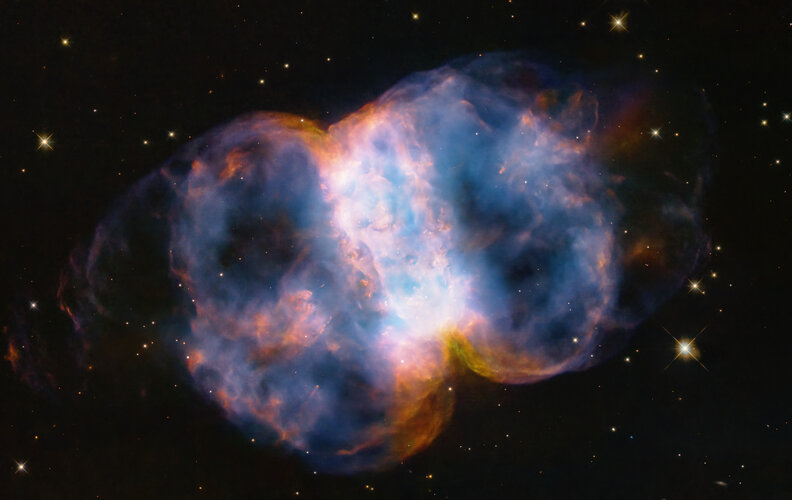34 years of science and imagery
Since its launch in 1990 Hubble has made 1.6 million observations of over 53 000 astronomical objects. To date, the Mikulski Archive for Space Telescopes at the Space Telescope Science Institute in Baltimore, Maryland holds 184 terabytes of processed data that are science-ready for use by astronomers around the world to use for research and analysis. A European mirror of the public data is hosted at ESA's European Space Astronomy Centre (ESAC), in the European Hubble Space Telescope (eHST) Science Archive.
Since 1990, 44 000 science papers have been published from Hubble observations. This includes a record 1056 papers published in 2023, of which 409 were led by authors in the ESA Member States. The demand for using Hubble is so high it is currently oversubscribed by a factor of six.
Throughout its past year of science operations, new discoveries made using Hubble include finding water in the atmosphere of the smallest exoplanet to date, spotting a bizarre cosmic explosion far from any host galaxy, following spokes on the rings of Saturn and finding the unexpected home of the most distant and powerful fast radio burst yet seen. Hubble’s studies of the asteroid Dimorphos, the target of a deliberate NASA spacecraft collision in September 2022 to alter its trajectory, continued with the detection of boulders released by the impact.
Hubble has also continued to provide spectacular images of celestial targets including spiral galaxies, globular clusters and star-forming nebulae. A newly forming star was the source of a cosmic light show. Hubble imagery was also combined with infrared observations from the NASA/ESA/CSA James Webb Space Telescope to create one of the most comprehensive views of the Universe ever, an image of galaxy cluster MACS 0416.
Most of Hubble’s discoveries were not anticipated before launch, such as supermassive black holes, the atmospheres of exoplanets, gravitational lensing by dark matter, the presence of dark energy, and the abundance of planet formation among stars. Hubble will continue research in those domains, as well as capitalising on its unique ultraviolet-light capability to examine such things as Solar System phenomena, supernova outbursts, the composition of exoplanet atmospheres, and dynamic emission from galaxies. And Hubble investigations continue to benefit from its long baseline of observations of Solar System objects, variable stellar phenomena and other exotic astrophysics of the cosmos.
The performance characteristics of the James Webb Space Telescope were designed to be uniquely complementary to Hubble, and not a substitute. Future Hubble research also will take advantage of the opportunity for synergies with Webb, which observes the Universe in infrared light. Combined together, the complementary wavelength coverage of the two space telescopes expands on groundbreaking research in such areas as protostellar discs, exoplanet composition, unusual supernovae, cores of galaxies and chemistry of the distant Universe.
The Hubble Space Telescope has been operating for over three decades and continues to make ground-breaking discoveries that shape our fundamental understanding of the Universe.
More information
The Hubble Space Telescope is a project of international cooperation between ESA and NASA.
Contact:
ESA Media relations



